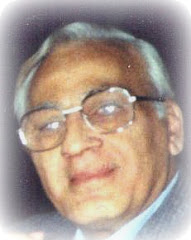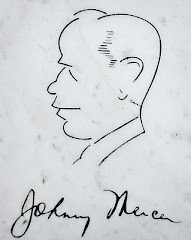This was originally run earlier this month at Emma's Music, the blog of recording artist Emma Wallace. I wanted to share it with my Standard of the Day readers... 
Set ‘em up Joe…
I’ve got a little story I think you should know…
In 1941, the father of Johnny Mercer, one of America’s finest songwriters of all time, lay dying, the money accrued during his many years as a prominent Savannah, Georgia attorney and real estate developer depleted on medical bills. It was Johnny who supported his father as the end neared, using the vast fortune he had acquired in the career his father had so fervently disapproved of just a dozen or so years prior. Because Johnny was independent enough to refuse his father’s demands that he continue in the family business, he was able to provide his father with the care he so desperately needed as death approached. And he was able to provide the nation, and the world, with a musical gift that will never die.
Last year, the man who may very well have been the finest popular lyricist who ever lived, was celebrated for the centennial anniversary of his birth; an event that occurred in the American south—a land whose traditions and culture shaped the art he would later create. The Johnny Mercer Centennial allowed for a very welcome rediscovery of the work of this great man, brilliant composer and all-around unique American personality.
When we met,
I felt my life begin.
So open up your heart,
And let this fool rush in.
As with many of the great songbook composers, Mercer brought something very special to the table. Whereas Cole Porter was known for his genteel sophistication; Irving Berlin for the Jewish-American experience through which his music was filtered; Jerome Kern for the influence of European musical theatre, and so forth; Mercer was perhaps the most distinctly American of them all. He brought a folksy, breezy, down-home sensibility that was a breath of fresh air and a never-ending source of delight.
More than the rest, his music was influenced by the “race music” of his youth, the hot jazz and blues that was becoming all the rage in the 1920s, his formative years. The Great American Songbook tradition has often been called the last gasp of the European art music tradition, and this is certainly true; but in Mercer’s case, perhaps more than anyone else’s, there was a very American, folk music flavor that permeated the music and lyrics—a precursor to the kind of influence that would later give rise to rock ‘n roll and other genres.

Then I kiss your lips,
And the pounding becomes
The ocean’s roar; a thousand drums.
Can’t you see that it’s love? Can there be any doubt?
When here it is, day in, day out.
But make no mistake about it—the songs of Johnny Mercer were no mere folk/pop baubles, but rather, powerful, deeply moving and heartwarming pieces of work that resonate to this day, and epitomize what the term “pop standard” means. A competent tunesmith, he was even better known for his sublime lyrics, as much inspired by his upbringing as by his immersion in literature and poetry during his school years.
A Johnny Mercer lyric is a thing of beauty like very few things in this life are. For many, the brilliance of what he did derived from the graceful structure he employed, introducing a simple, poignant concept, developing it, and then cleverly bringing it full circle to a conclusion that was always sure to floor the listener. Often combining his lyrical talents with songwriters like Harold Arlen, Henry Mancini and Hoagy Carmichael, he could always be relied upon to deliver something that was about as far from clichéd, hackneyed or insincere as possible.

Things never are as bad as they seem,
So dream, dream, dream…
Composing for stage, screen, and the Tin Pan Alley publishing machine, he churned out classic after classic: “One for My Baby,” the consummate saloon song, composed for Fred Astaire but immortalized by Frank Sinatra. “That Old Black Magic,” an infectious gem of insistent beauty. “Goody, Goody,” that playful anthem of petty retribution. “Come Rain or Come Shine,” a later ode to obsessive adoration, allegedly inspired by his legendary love affair with Judy Garland. “Blues in the Night,” perhaps his most successful tune, and one directly inspired by the music of his youth. “I Remember You,” whose heartbreaking lyric distills the pure melancholy of love into verbal form. The brooding, vindictive “I Wanna Be Around.” “Jeepers Creepers”; “You Must Have Been a Beautiful Baby”; “Day In, Day Out”; “Fools Rush In”; “I’m Old-Fashioned”; “Laura”. The list of unforgettable masterpieces goes on and on.
On four different occasions, his work in movies was recognized with an Oscar for Best Original Song, back when that award actually meant something important. “On the Atchison, Topeka and the Santa Fe” in 1946 and “In the Cool, Cool, Cool of the Evening” in 1951, followed by two of his later and most well-remembered hits, “Moon River” from 1961’s Breakfast at Tiffany’s and “Days of Wine and Roses” the following year. Those last two proved the staying power of this musical juggernaut, lasting well into the era when rock and be-bop had begun to erode interest in the songbook tradition.

Days may be cloudy or sunny,
We’re in or we’re out of the money.
But I’m with you always,
I’m with you, come rain or shine.
Unlike many songwriters, who either lacked the ability or the outgoing personality, Mercer was also able to distinguish himself as a popular singer, both of his own songs and those of others. From the 1930s through the 1950s, he was a common fixture on radio and record, even dueting with the likes of Sinatra and Billie Holiday. Given his larger-than-life image and general enthusiasm, it was easy to see why this would be so. It wasn’t so much that his singing matched his songwriting ability; it didn’t. Rather, Mercer was an irresistible force, whose passion for what he did was evident to all that heard it.
The Great American Songbook has given us many fine lyricists: Ira Gershwin, Cole Porter, E.Y. Harburg, Lorenz Hart… And yet, in the opinion of this writer—and many others—Mercer surpassed them all. The man had an ear for music, make no mistake about it; but when all is said and done, it is the words he gave us, the thoughts and feelings he expressed alongside those aching melodies, for which he will always be best remembered. Clever, frank, mischievous, wistful and morose—Johnny Mercer was all of these things. His art remains as a testament to all that. And all those who listen are better for it.

When my life is through,
And the angels ask me to recall the thrill of them all,
Then I shall tell them, I remember you.
* I'd like to thank the official Johnny Mercer Centennial committee for recognizing this piece. It truly is an honor.
 By Isham Jones & Gus Khan
By Isham Jones & Gus Khan










































